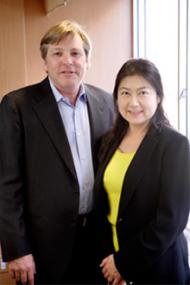David Baran

- Classification
- Equity
- Company
- Symphony Financial Partners Co., Ltd.
Senior Japanese equities/equity derivative proprietary trader at Lehman, Goldman Sachs and Barclays in Tokyo; University of California, Berkeley (B.A.), Columbia University (M.A.)

We are value investors with a twist. We like to help speed the value realization process by working with management. Value investing has been proven over decades of research to be the most successful investment strategy over the long run, yet few people practice value investing. I did my masters at Columbia University, where value investing is almost a religion at the business school. So it was natural for me to become a value investor.
Like most value investors、 we like to invest in companies with strong businesses that have solid balance sheets and low levels of debt. We also like to find unique businesses where there are some tangible or intangible barriers to entry. We don’t like commoditized businesses or industries with lots of government control or influence.
In addition to looking for mispriced companies, we also need to look for strong management teams. The management is what drives the company forward, and if a great business is being run by a poor manager, the chance of success is diminished. We like to find managers who are also highly invested personally in the company, because this gives them added incentive to make the company successful and have the share price grow.
We prefer to invest in large positions in our portfolio companies. This lets management know we are committed to working together to get the market to re-rate the company higher.
The change in management attitude toward value realization and stock re-rating is profound and dynamic. The financial crisis of ‘08 accelerated what was already a strong trend among companies to adopt better corporate governance and raise their consciousness about shareholder returns. Now that we have passed through this stage of financial turmoil and economic distress, managers are keener than ever to rebuild their trust with shareholders. At the same time, shareholders of all forms, foreign and domestic, are demanding much more from management in terms of transparency, accountability and performance.
The most important change I think has come not from the company management but from investors, particularly domestic investors. Their willingness to challenge the status quo and demand better performance is what has and will continue to change the nature of corporate management and investors relations in Japan. Although there have been some false starts, regulatory agencies, the TSE, the various Ministries and pension/life/trusts are all pressing for more and better performance.
This is also creating an entirely new perspective on the value and merits of being a listed company. There is a much greater willingness to pursue M&A activity, MBOs and other forms of corporate actions which catalyze value realization. This creates abundant opportunities for Symphony.

With Japanese equities having dropped to levels not seen in 20 years, there are abundant opportunities, particularly for value investors. Japanese equities are out of favor with investors both foreign and domestic. But foreign investors are starting to take a renewed look at the market. Many companies trade at low P/B, single digit EV/EBITDA multiples, at discounts to their break-up value, or even at discounts to their net cash. These mispricings happen from time to time here and in other markets but rarely do they happen across such a wide number of companies at the same time. This is creating a great opportunity to invest in solid companies which, in time, will be re-rated to properly reflect their true value. And they will be re-rated because management is now aware of investors’ demands. Management teams are increasingly considering seriously how to use tools such as M&A, share buybacks, dividend policies to enhance shareholder returns.
Within this vast group of mispriced companies we look for those with indispensable technologies, oligopolistic businesses, or processes which will benefit from the global recovery and from shifts in energy usage and other ecologically friendly industrialization. We also see many companies which will benefit directly and indirectly from the continued economic growth in China and other Asian nations.
Another interesting but little discussed opportunity is estate planning. We have an expertise in working with individual company founders on strategies that can help lower their estate taxes. As more and more demands are being put on listed companies for disclosure, adoption of J-SOX, conversion to IFRS, etc., management teams are increasingly considering the option of delisting the company and operating it as a private entity. This option can provide highly attractive benefits to a company facing estate planning issues. It is an area that has a great deal of future potential.

Working as a proprietary trader at an investment bank like Goldman, there are many limitations placed upon you. It is extremely difficult to be small and nimble. You must also always be aware of how the rest of the firm is performing and how that will impact you. There is always the risk that you could get reassigned to another part of the firm in another country. I am and plan to remain a resident in Japan.
By moving to the buy side, and more specifically setting up Symphony with Shibata-san, I was able to take a more entrepreneurial and exciting route towards investing in Japan. There are great companies in Japan which would be difficult to access and invest in if I remained on the sell side. Being on the buy side gives me the freedom to challenge preconceived ideas about investment opportunities in Japan, thereby creating value for our investors.
Symphony was founded by Kazuhiko Shibata and myself back in 2000. We had worked together on a number of projects in Japan mostly in a private equity principal or advisory capacity. We come from different background. Shibata-san was an 18-year veteran at Nomura where he focused on corporate advisory for Nomura and its clients; I spent most of my professional career at international investment banks trading Japanese equities and equity-linked products.
We both felt that, together, we could create a team focused on investing in undervalued listed companies in Japan and working with management to increase the value of their enterprise, not through controlling them but through cooperation. By 2003 we had created the SFP Value Realization Fund.

This is a tough one. I have three interesting books which everyone should read.
1. Security Analysis by Benjamin Graham and David Dodd
2. Reminiscences of a Stock Operator by Edwin Lefevre
3. Secrets of Professional Turf Betting by Robert Bacon
All three of these book offer different insights into thinking about the investment process. Security Analysis is the seminal work on value investing which all investors, professionals and layman should read before embarking on securities investing. It gives a solid framework for investment decision making.
Reminiscences of a Stock Operator is a classic story about how the markets operate. It is less devoted to the theory of valuation and more about how money is made and lost in the markets.
Lastly, Secrets of Professional Turf Betting is an inside look at risk management. It offers a different perspective than an academic discourse on the topic and focuses more on real life examples drawn from a related yet similar industry. I understand it is required rereading at some hedge funds in the U.S.
Nikkei Sangyo
Nikkei VERITAS
Kabushiki Shimbun
Asian Wall Street Journal
Herald Tribune
Nikkei Newspaper
Financial Times
Bloomberg
Grant’s Interest Rate Observer
http://www.tse.or.jp/
http://www.jsda.or.jp/
http://www.iasb.org/Home.htm/
http://www.fasb.org/home
https://www.asb.or.jp
http://www.a2msn.jp/portal/index.html
http://www.azsa.or.jp/
http://www.fsa.go.jp/
http://www.nedo.go.jp
http://www.federalreserve.gov/
http://www.mbaa.org/default.htm
http://www.moodys.com/
http://www2.standardandpoors.com
http://www.r-i.co.jp/jpn/
http://www.jcr.co.jp/
http://www.tdb.co.jp/
http://www.bis.org/publ/bcbsca.htm
http://www.gov.cn/english/special/115y_index.htm
http://www.semi.org/jp/index.htm
http://www.semicon-news.co.jp/
http://www.jmtba.or.jp/
http://www.jtma.or.jp/
In addition all the analyst have their own favorite sites. Some of mine are:
www.RGM.com
www.dealreporter.com
www.dealbreaker.com
www.meti.go.jo
That’s all the questions we have. Thank you very much for your cooperation.
Interviewer:
Akane Hashimoto
Managing Director, Investment and Research
Photographer:
Wataru Sato
Notes:
This article originally appeared on January 26, 2010. Any views presented in this article are as of such date and are subject to change.
This article and the information provided therein are not a recommendation to purchase or sell any security, nor are they intended to constitute the marketing of, or a solicitation for investment in, any investment product.
Symphony is an Asia-based asset manager with offices in Tokyo and Singapore. The firm was founded in 2000 by David Baran and Kazuhiko Shibata, both veteran finance professionals with decades of experience in Asian markets. The firm launched its Japan fund (the SFP Value Realization Master Fund) in 2003 and its pan-Asia fund (Sinfonietta) in 2008.
Senior management members:
David Baran (Co-CEO): former senior Japanese equities/equity derivative proprietary trader at Lehman, Goldman Sachs and Barclays in Tokyo; University of California, Berkeley (B.A.), Columbia University (M.A.) Kazuhiko Shibata (Co-CEO): former principal investment, M&A and real estate banker at Nomura Securities in New York and Tokyo; Hitotsubashi University (B.A.), Harvard Law School (LL.M.) Jason Schwartz (Managing Director): former M&A, strategic advisory and capital markets banker at Goldman Sachs and Lehman in New York and Tokyo; U. Penn ? Wharton School (B.S.), U. of Tokyo (M.A.), Columbia Law School (J.D.)
Our strategy focuses on investing in underpriced, high-quality Japanese companies and working cooperatively with management to improve valuation. This is a superior strategy for creating long-term profits in Japan because of the potential upside and because it does not solely rely on the vagaries of the overall market’s performance.
It is our fundamental contention that the Japanese market does not work in the same way as markets in other advanced economies because there is no market for corporate control. Inefficiencies persist due to a lack of catalysts forcing change in the status quo.
We take this basic premise and identify high-quality companies that are trading at substantial discounts to intrinsic value. We then analyze companies from the perspective of the potential upside we could catalyze as a hands-on shareholder, including changes in financial and strategic areas. We work in a friendly and cooperative manner with management, consistently bringing them real and actionable ideas for positive change. When we have done this successfully over a period of time, we can then gain the trust of senior management. Once we have gained their trust, we are then able to most effectively impact real company decision making and catalyze value-enhancing change.

December 25, 2011
by Investment in Japan

